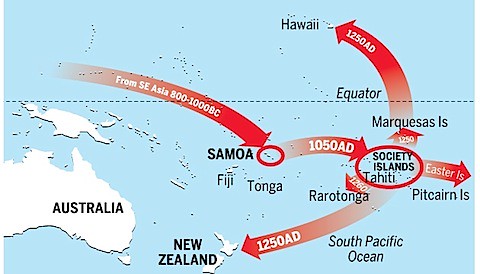New Zealand's Sunday Star Times has a good graphic that shows the new model of colonization of Eastern Polynesia. You can read the rest of the story here: http://www.stuff.co.nz/sunday-star-times/news/latest-news/4498668/Pacific-colonisation-one-big-pulse
Tuesday, December 28, 2010
High-precision radiocarbon dating shows recent and rapid initial human colonization of East Polynesia
Our (Janet Wilmhurst, Terry Hunt, and Atholl Anderson) paper on an analysis of 14C dates for eastern Polynesia has been published in PNAS. It's an Open Access publication so you download it at: http://www.pnas.org/content/early/2010/12/22/1015876108.full.pdf. We've had a bit of new coverage for it:
http://www.stuff.co.nz/sunday-star-times/news/latest-news/4498668/Pacific-colonisation-one-big-pulse
http://www.radionz.co.nz/news/world/65209/pacific-colonisation-more-recent-than-thought
http://www.everythinglongbeach.com/discovery-eastern-polynesia-colonization/
Sunday, December 26, 2010
festivus, christamus, and other holidays
I hope you all are having a wonderful holiday of whatever sort you prefer.
Wednesday, December 22, 2010
Such good timing...
The AAA has such amazing timing -- When a historic bill funding more science and science education gets passed, what is the AAA doing? Busy removing all reference to science from its mission statement. Blargh.
http://www.nature.com/news/2010/101222/full/news.2010.693.html
Dreams of a U.S. renaissance in basic research were kept alive today when the U.S. House of Representatives passed the America COMPETES Act, a key funding bill for the physical sciences. The milestone came as a huge relief to supporters of the bill, which only last week seemed likely to die with the current Congress at the end of this year. But after a dramatic rally of support in the US Senate on Friday, the bill found itself back in the House, where it was briskly shepherded through to a final vote this afternoon. The bill now goes to President Barack Obama to be signed into law.
COMPETES is a reauthorization of a three-year 2007 act that followed recommendations in Rising Above the Gathering Storm, a 2005 report from the U.S. National Academies. The report supported increased funding for science education and placed certain science-funding agencies, including the National Science Foundation and the National Institute of Standards and Technology, on a path to double their funding over ten years, relative to a 2007 baseline.
The bill's passage is a major victory for Congressman Bart Gordon (Democrat, Tennessee), who spearheaded the legislation in 2007 and again this year. Gordon is retiring from the House after three years as chairman of the House Committee on Science and Technology, and says that he sees COMPETES as part of his legacy. "There is nothing I'm more proud of than the America COMPETES bill," Gordon told the House during the floor debate. "I cannot think of anything I would rather be doing in what is likely my final act on the House floor in 26 years of service than sending this bill to the president's desk."
Monday, December 20, 2010
Thursday, December 16, 2010
Words, Culture, and Change
Hector Neff just sent me the link to the Culturomics website. This project (with paper in Science) uses digitized books (from Google Books) representing some 4% of all books ever printed to track word usage over time. Amazing. A whole host of folks were involved -- including Pinker, Nowak and Jean-Baptiste Michel.
We constructed a corpus of digitized texts containing about 4% of all books ever printed. Analysis of this corpus enables us to investigate cultural trends quantitatively. We survey the vast terrain of "culturomics", focusing on linguistic and cultural phenomena that were reflected in the English language between 1800 and 2000. We show how this approach can provide insights about fields as diverse as lexicography, the evolution of grammar, collective memory, the adoption of technology, the pursuit of fame, censorship, and historical epidemiology. "Culturomics" extends the boundaries of rigorous quantitative inquiry to a wide array of new phenomena spanning the social sciences and the humanities.
You can play with the data (and download it!) at http://ngrams.googlelabs.com/. Check out, for example, "bell bottoms".

or compare "bowler hat, fedora and baseball cap"

This is a fantastic look at how cultural terms vary over time with all kinds of implications for studying rates of changes, functional contexts, etc. Very cool! Not too many anthropologists on that co-author list!
Wednesday, December 15, 2010
RC Dunnell
A couple of more recent photos of RCD doing what he enjoyed: talking about archaeology and looking at archaeology. In this case, discussing plummet variability and a mound up on the bluff near Natchez.. Photos from Natchez, 2010 with Tim Hunt. Thanks to Dan Shepherd
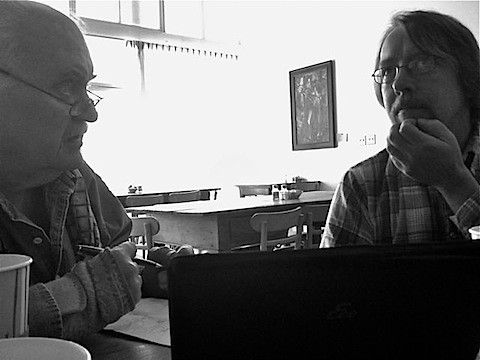
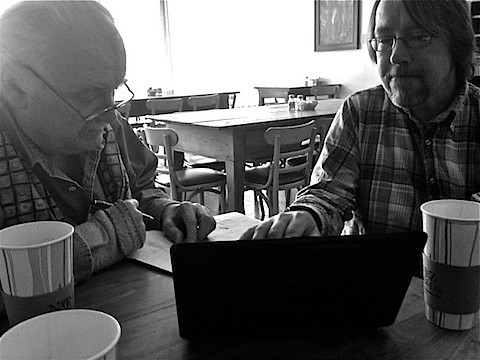
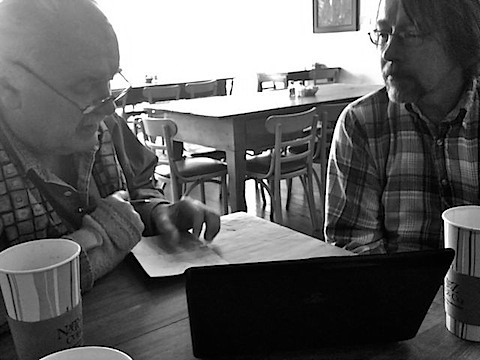
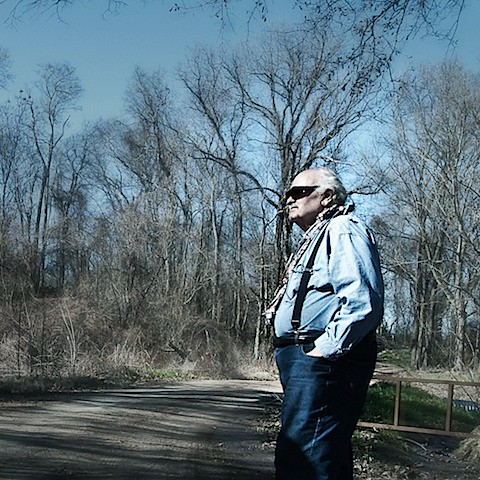
Tuesday, December 14, 2010
More on the Anthropology Mission Statement Debacle...
Razib Khan writes on his Discover Magazine blog about the AAA anti-science movement.
http://blogs.discovermagazine.com/gnxp/2010/12/the-unbearable-whiteness-of-science/
How would you feel as a chemist if professional meetings were dominated by alchemists? If you were a neurologist specializing in traumatic brain injuries who had to go to conferences where they mostly talked about Qi? I’ve personally listened to enough cultural anthropologists who seem to be channeling aliens for whom Michel Foucalt is God as they issue forth a river of impenetrable jargon that I have sympathy for the frustration.
Monday, December 13, 2010
RIP Robert C. Dunnell
More later, but just wanted to share the sad news that Robert Chester Dunnell died today. Very sad.
Sunday, December 12, 2010
Science and Anthropology
Science is what makes the world safe for cultural anthropology. Really. It is only because we can sort out ideas that have empirical performance versus those that are opinions, beliefs, culture, linguistic stylings, fancy, flair, speculations, musings, diatribes, claims and proclamations that we provides something for cultural anthropologists to study. The sorting maybe messy and fraught with human confusion, but it works over the long run. Lacking performance values, these ideas must be free to vary as well as the people who have them. Science sorts out ideas, for example, that claim disease is caused by 'vapors' versus those ideas in which disease is caused by infectious agents. It also demonstrates that same-sex parenting produces children no worse off than multiple sex parents or that gay soldiers are no worse off doing their job than heterosexuals. Science makes it possible to tell misanthropes to shut the hell up.
Ruth Benedict has said "the purpose of anthropology is to make the world safe for human differences." Not quite. Science does this by allowing us to evaluate claims that human differences are somehow "wrong." Anthropologists get the safer world as a freebee.
And the AAA wants to get rid of science as part of its mission?
Friday, December 10, 2010
Anthropology in the NY Times
Nicholas Wade reported on the AAA mission statement change in yesterday's NY Times. Interestingly Daniel Linde comments in a PLoS Blog on what Wade reports and largely argues that everyone is making mountains out of mole hills. He states that the mission statement was supposed to be just "internal" and not a public affair. He argues that changing the mission statement just means that we are "moving forward" and that it is just recognizing the previous role of colonialsm. Its a puzzling argument. Why does removing science from a mission statement simply "a field moving forward?" He seems to have fallen into the trap of equating our colonialist ancestors (and their science mission) with science itself. That's just bad logic and sloppy thinking.
To end his blog he quotes, Catherine Lutz who is "most definitely a critical anthropologist" (suggesting that they are the "real" anthropologist and thus the authority on what is and isnt anthropology). She states that "Most departments of anthropology happily work together each day with a diversity of members, some of whom take more humanistic approaches and some of whom take more scientific ones. All of them aspire to rigor and rarely disparage either their colleagues in biochemistry or their colleagues in French literature for not understanding the worlds that they choose to study…"
It's unclear, of course, from where her data for "most departments" comes. At best, I would argue that Departments live under a kind of detante. At worst, the situation consists of a majority rule of one form or another with a disgruntled minority. I suspect true respect is fairly rare given the competition for resources and the vastly different products that come from a "humanities" based anthropology versus any form that seeks a science based discipline. The most happy departments Ive seen have simply opted to pick one area for their focus rather than try to squeeze in such disparate goals.
Sunday, December 5, 2010
AAA, Science and the politics of lame
Alice Dreger follows up her previous discussions on the dropping of science from the AAA mission and nabs some good quotes from Mark Collard. http://www.psychologytoday.com/blog/fetishes-i-dont-get/201012/the-remains-the-aaa
Meanwhile, the AAA continues to be confused. When questioned about this move the AAA spokesperson (Damon Dozier) stated that:
The removal of any mention of science from the plan's mission statement applies only to the long-range plan -- and not to the organization itself or its larger direction
And that despite the simple closed-minded assertion that resulted in this fiasco,
That's how our process works, and I think it's a very open process.
I've seen these kinds of shenanigan's before. Decisions are made a head of time and others are invited in to "comment" after the fact. Then the commentors are claimed to be subversive and a minority based on that the majority is unaware or doesn't care. It is a great way to demoralize smaller groups with diverse interests and solidify a fascist style administration. Classic thuggery.
Saturday, December 4, 2010
Dear AAA Executive Committee...
Anthropology Vs. Science
For any of you who would rather see an animated recreation of the dialogue between anthropology, the AAA and science, you can now view it here:
AAA responds with a lame plea...
Apparently, we are supposed to believe that removing science was done to be "more inclusive." Orwellian double speak for "we don't give a crap."
http://www.aaanet.org/about/Governance/Long_range_plan.cfm
From the officers of the AAA to our membership:Our AAA long-range plan needed updating in order to address the changing composition of the profession and the needs of the AAA membership. At its November 20 meeting in New Orleans, the Executive Board specified, concretized, and enlarged its operational roadmap for investing the Association’s resources towards a sustainable future. Section leadership was consulted prior to the New Orleans Annual Meeting, and the Executive Board acted. Then immediately after the highly attended 2010 AAA Meetings in New Orleans, some criticisms of the plan were circulated electronically that had not been sent our way prior to the Meetings. Among them were thoughtful responses from several quarters, many queries about hearsay, and some suggestions for improvement or change. These responses, however, were amped up by blog headline editors earlier this week: “Anthropology Without Science,” and “No Science Please. We’re Anthropologists.” We believe that the source of the problem speaks to the power of symbols: we replaced the term “science” in the preface of this planning document by a more specific (and inclusive) list of research domains, while explicitly acknowledging that the Association’s central focus is to promote the production, circulation, and application of anthropological research findings. Each one of us (the four officers of the AAA) may add or comment on the issues separately, but collectively we care about letting the entire association see the document at hand. We know that comments will continue to come our way and we welcome them from our clearly engaged membership.
Virginia R. Dominguez, President
Leith Mullings, President-Elect
Debra L. Martin, Secretary
Thursday, December 2, 2010
RCD: Lifetime Achievement Award
If only as a gesture towards thumbing the nose at anti-science anthropology establishment you might consider helping us nominate Robert Dunnell for the Society for American Archaeology Lifetime Achievement Award. Diana Greenlee has put the announcement out that Bill Dancey and Janet Rafferty are compiling nomination letters in support of RCD.
I hope you will consider writing a letter of support. Here are the key points:
- The support letters have to be submitted as signed pdfs, either using an electronic signature or by scanning a signed document.
- Letters should be on letterhead.
- Please email your letter to Janet at rafferty@anthro.msstate.edu, or send a hard copy via snail mail to Janet Rafferty, P.O. Box AR, Mississippi State, MS 39762. She will convert any non-pdfs and/or scan any hard copy letters
- f possible, we'd like the letters by 23 December so that everything can be submitted before the holidays..
- Please contact Janet or me with any questions
Wednesday, December 1, 2010
The Descent of Anthropology...
Discussion about the AAA's decision to remove "science" from its mission statement continues. Julienne Rutherford (a physical anthropologist working at the interesting convergence of the School of Dentistry and the Departments of Oral Biology and Anthropology at the University of Illinois at Chicago) has posted some useful comments about this action. You can find her writing here:
- http://aapabandit.blogspot.com/2010/11/place-of-science-in-anthropology.html
- http://aapabandit.blogspot.com/2010/11/cross-field-anthropology-opportunities.html
Michael Smith has also commented on the AAA's mission change:
